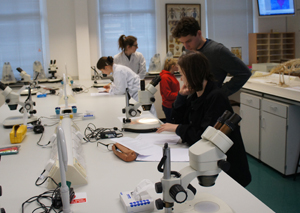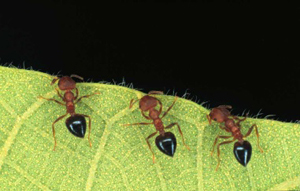 As a Natural Sciences undergraduate you will have the opportunity to choose courses from a variety of scientific disciplines; combinations are flexible so you can base your study around topics that interest you. The Tripos consists of:
As a Natural Sciences undergraduate you will have the opportunity to choose courses from a variety of scientific disciplines; combinations are flexible so you can base your study around topics that interest you. The Tripos consists of:
- Part IA (first year)
Four courses
- Part IB (second year)
Three courses
- Part II (third year)
One course
Below is a summary of Zoology teaching across the Natural Sciences, with links to individual courses websites containing further information. For details on all courses within the Tripos, including those which don’t involve Zoology, please visit the Natural Sciences website.
 Part IA
Part IA
In your first year you will study three experimental subjects and one mathematical subject. Zoology contributes to four of these courses (highlighted in bold):
Evolutionary Behaviour—Biology of Cells—Physiology of Organisms—Chemistry—Computer Science—Earth Sciences—Materials Science—Physics
Mathematical Biology—Mathematics
Part IB
Students select three subjects from a list of nineteen. Having started with a broader biological sciences base, in the second year you will begin to specialise in particular areas. Zoology contributes to four of these courses (highlighted in bold):
Evolution and Animal Diversity—Cell and Developmental Biology—Ecology and Conservation—Neurobiology—Biochemistry and Molecular Biology—Biology of Disease—Chemistry A—Chemistry B—Experimental Psychology—Earth Sciences A—Earth Sciences B—History and Philosophy of Science—Materials Science—Mathematics—Pharmacology—Physics A— Physics B—Physiology—Plant and Microbial Sciences
 Part II Zoology
Part II Zoology
In the third year of the Natural Sciences Tripos, you will be able to specialise in the area that most interests you. There is no set combination of courses you need to have taken in order to study Part II Zoology; however, most students will have taken a selection of Evolutionary Behaviour, Biology of Cells, Physiology of Organisms, and/or Mathematical Biology in their first year. The second year is more flexible and dependant on your individual interests, but many students choose to study Evolution & Animal Diversity, and/or Ecology & Conservation.
 Students choose four modules to study from fifteen—these modules cover a wide range of topics (animal behaviour, conservation science, ecology, evolution, cell and developmental biology). For more information on the course please visit our Part II Zoology webpage.
Students choose four modules to study from fifteen—these modules cover a wide range of topics (animal behaviour, conservation science, ecology, evolution, cell and developmental biology). For more information on the course please visit our Part II Zoology webpage.
